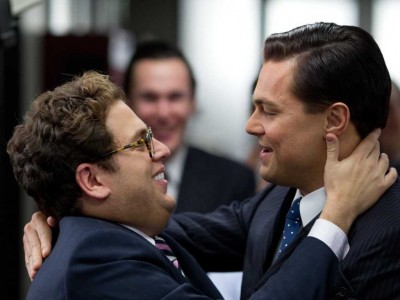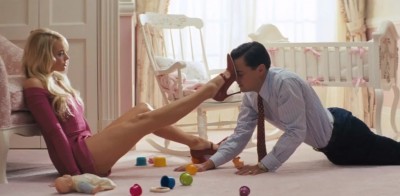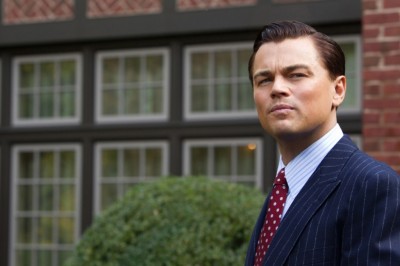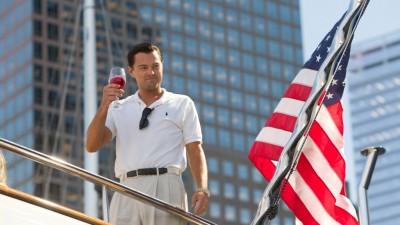
There are only a handful of films in any given year that bring a smile — really, a series of smiles — to my face for the sheer audacity of the filmmaking. Martin Scorsese’s The Wolf of Wall Street is one such film. Every so often there is a certain use of the camera, a composition or an edit that delighted me far more than any of the year’s big special effects. It’s the kind of sensation that you only get from a master filmmaker — and the occasional upstart newcomer — and it restores one’s faith a little in film for its own sake. And yet, I have to say this is perhaps not quite top-tier 21st-century Scorsese. Oh, it’s great. I’m not sure I’ve ever seen a three-hour movie that moved this beautifully. The performances are all first rate and there’s really nothing to complain about. Still, The Wolf of Wall Street, for all its brilliance, isn’t going to score the No. 1 spot on my 10-best list of the year — something Scorsese’s last two pictures did without much contest. It will be on that list — and in the top half — but not at the very top. Why? Simply because — at least on one viewing — it entertained, it impressed, it even wowed, but it didn’t really connect with me emotionally.

It’s interesting that The Wolf of Wall Street comes out at the same time as David O. Russell’s American Hustle, because it’s essentially American Hustle‘s ugly twin. Besides both being fact-based (Wolf more so than Hustle), the two films are also studies of amoral characters pursuing twisted versions of the American Dream. But the tones are very different. Russell’s film is cheerfully amoral. It’s a cheeky conceit — and it can be because it’s about not very bright people getting in over their heads and damaging themselves as much as anybody. Scorsese’s film is a separate proposition. Its characters aren’t always all that smart, but they’re avaricious monsters inflicting a great deal of damage on others. That they are — sort of — brought down by their own arrogance doesn’t change this. The characters that populate Wolf may be — they are — entertaining and amusing, but they’re never likable in any significant way. (I have heard a story of an audience of high-roller investment brokers who cheered the amassed perfidy on the screen, but let’s assume they are not your average viewer.)

Leonard DiCaprio stars — and largely carries the film — as real-life (and really crooked) investment broker Jordan Belfort, on whose memoir the film is based. DiCaprio matches the film’s intensity from the first frame. This is an excessive movie about excess and excessive people — that’s the key it starts in and maintains for its entire running time. You’ll either find it exhilarating or exhausting — or maybe a bit of both. The film is like the characters in that it never pauses to even briefly think anything over. It merely barges ahead — just like its drug-and-alcohol-fueled characters. The difference, of course, is that the film is rightfully sure of itself while the characters are not (though they think they are). Scorsese recognizes what’s happening is appallingly black comedy; the characters don’t. Scorsese is the one sober person in a film full of drunks — placidly observing their actions and turning them into dark humor. We’re talking about a filmmaker who can make a scene in which Belfort — drugged to a point where he can’t walk — manages to crawl to his Ferrari and drive home funny. Better still, he’s toying with us and has in store a different payoff than what we — or Belfort — think happened.

The Wolf of Wall Street is dynamite filmmaking on every level, but it’s also clearly not going to be to everyone’s liking. And that’s fine. No film should be, and if it is, there’s probably something wrong with it. However, this is the sort of movie that anyone who is seriously interested in the art of film should see. It’s one that I’m anxious to watch a second time — and maybe more. Rated R for sequences of strong sexual content, graphic nudity, drug use and language throughout, and for some violence.
Playing at Regal Biltmore Grande.



I highly agree with everything you wrote. I absolutely loved this film. Best picture this year. The scene you mentioned with the Lamborgini was my favorite. Scorcese just leaves the camera still and let’s De Caprio go crazy. Leo will get his much belated Oscar this year. Business movies never cease to express what a canibalistic rat cage the stock market is.
Scorcese just leaves the camera still and let’s De Caprio go crazy.
There’s more to Scorsese’s contribution than that.
Leo will get his much belated Oscar this year.
Highly doubt it. This is much more likely to be Chiwetel Ejiofor’s year.
[b]Leo will get his much belated Oscar this year. [/b]
Considering the Academy’s reaction wasn’t… uh, very enthusiastic (http://www.thewrap.com/Martin-Scorsese-Wolf-of-Wall-Street-Academy-Screening-Shame-on-You), I find that doubtful. Very doubtful.
Plus it’s DiCaprio. The Academy isn’t exactly head over heels for the guy.
Let’s be honest here — the article is all about the response of one 75 year old small part actress, Hope Holiday, who hasn’t made a film in nearly 30 years. And she’s also the one claiming walkouts and people abusing Scorsese — stuff that no one is backing up. (Of course, this kind of nonsense only makes me like the movie that much more.)
I find the Oscar thing doubtful, though, since the tide is very much in Ejiofor’s favor. And despite the fact that 12 Years a Slave still doesn’t quite work for me emotionally (neither does Wolf, but it’s not meant to), I don’t begrudge him that win.
I think Wolf deserves to be the prime challenger for 12 Years in the Picture, Director, Actor, Adapted Screenplay, Editing, and Cinematography races. I’d give the nod to 12 Years for the first three and Wolf for the second three.
What is deserved is a separate beast from what is likely to happen. (Not that I really agree with you, but what I think is deserved will never be nominated.)
Personally, I’m hoping for some more Joaquin Phoenix love, but given his stance on the matter, I don’t think that’ll happen.
Going to see this one tonight. It’s a pretty packed category for lead actor for me (Isaac, Phoenix, Hawke, Ejifor, Hanks, etc), so Leo is going to knock it out of the park.
I don’t get the love for Phoenix or for Her for that matter. I liked it better than any other Spike Jonze picture I’ve seen, but that’s not saying a whole lot.
I’m pretty much down for Ejiofor, followed by DiCaprio, followed by Isaac. Hawke is fine in Before Midnight, but not Best Actor fine for me. And both Hanks (I’m presuming you mean Captain Phillips) and the film in question were a big, “Meh,” for me. He has the advantage — Oscar voter-wise — of being “one of them” and he’s in a thoroughly safe, middle-brow movie.
Bruce Dern is #3 for me.
I’ll go for him for #4.
It’s interesting that The Wolf of Wall Street comes out at the same time as David O. Russell’s American Hustle, because it’s essentially American Hustle’s ugly twin.
And they both live and flourish in the long shadow of GOODFELLAS. In Hustle’s case, it’s just influence, but for this, I get the feeling that Scorsese was deliberately revisiting many of techniques, editing choices and flourishes from GOODFELLAS and CASINO to draw a comparison between the mafioso thugs of the former and their white-collar brethren here.
It could be viewed as the year of excessive movies about excessive people behaving excessively. You can lump Gatsby into the mix and, if you insist (Clapton forbid), Spring Breakers.
Pain & Gain, too.
Check out Filmspottings Wolf of Wall Street vs. American Hustle show this week its one for the ages.
http://www.filmspotting.net/
I had the good fortune to miss that.
It does seem to be in the zeitgeist at the moment.
THE GREAT BEAUTY also qualifies for inclusion in this set of excessive movies and excess. It’s an epidemic.
By the way, Chris, what I had the good fortune to miss was Pain and Gain, not that podcast.
Still haven’t seen it, but imagine The Bling Ring could occupy a spot on the list too. Along with maybe The Counselor in its own way.
That’s a solid maybe for me.